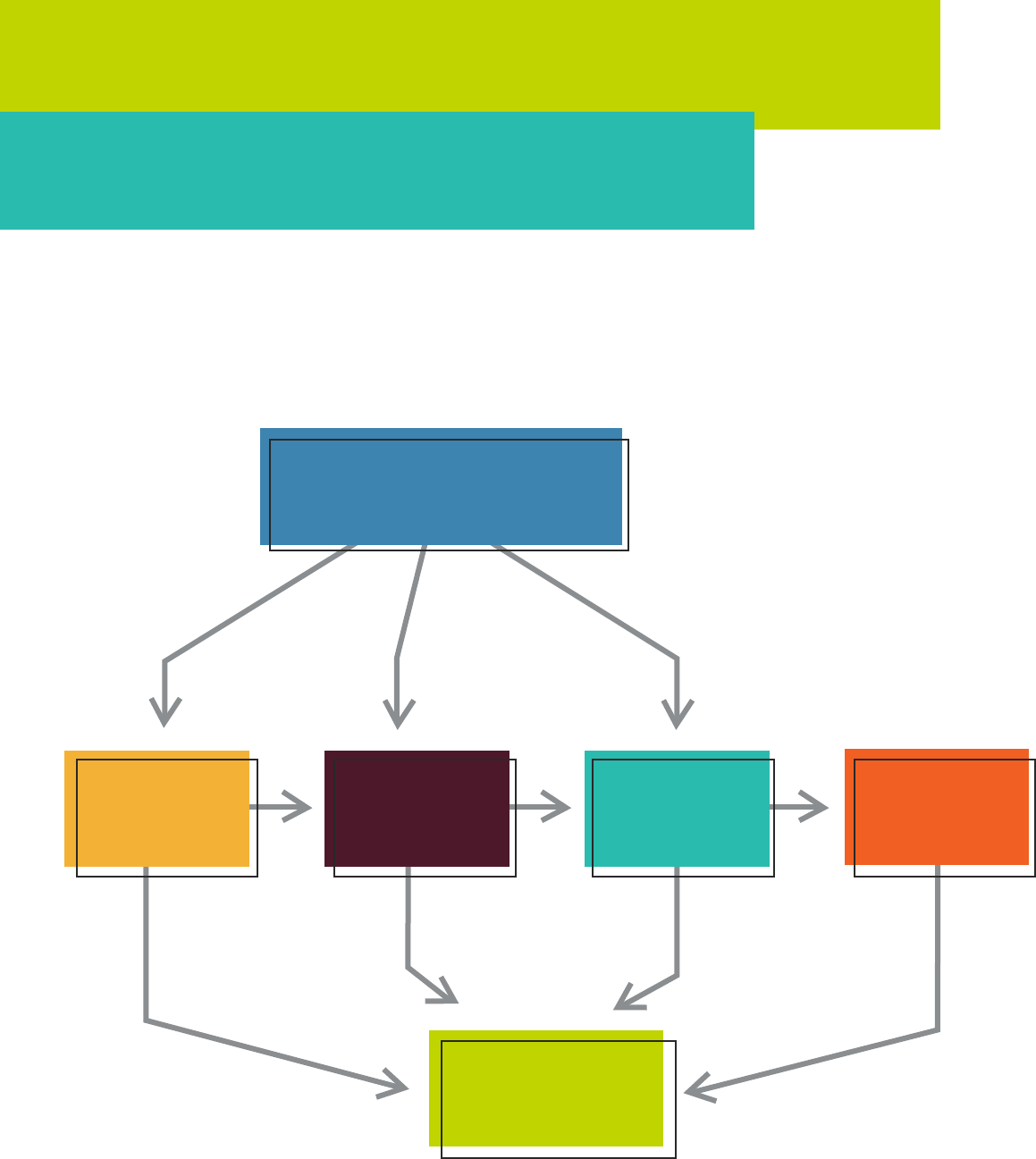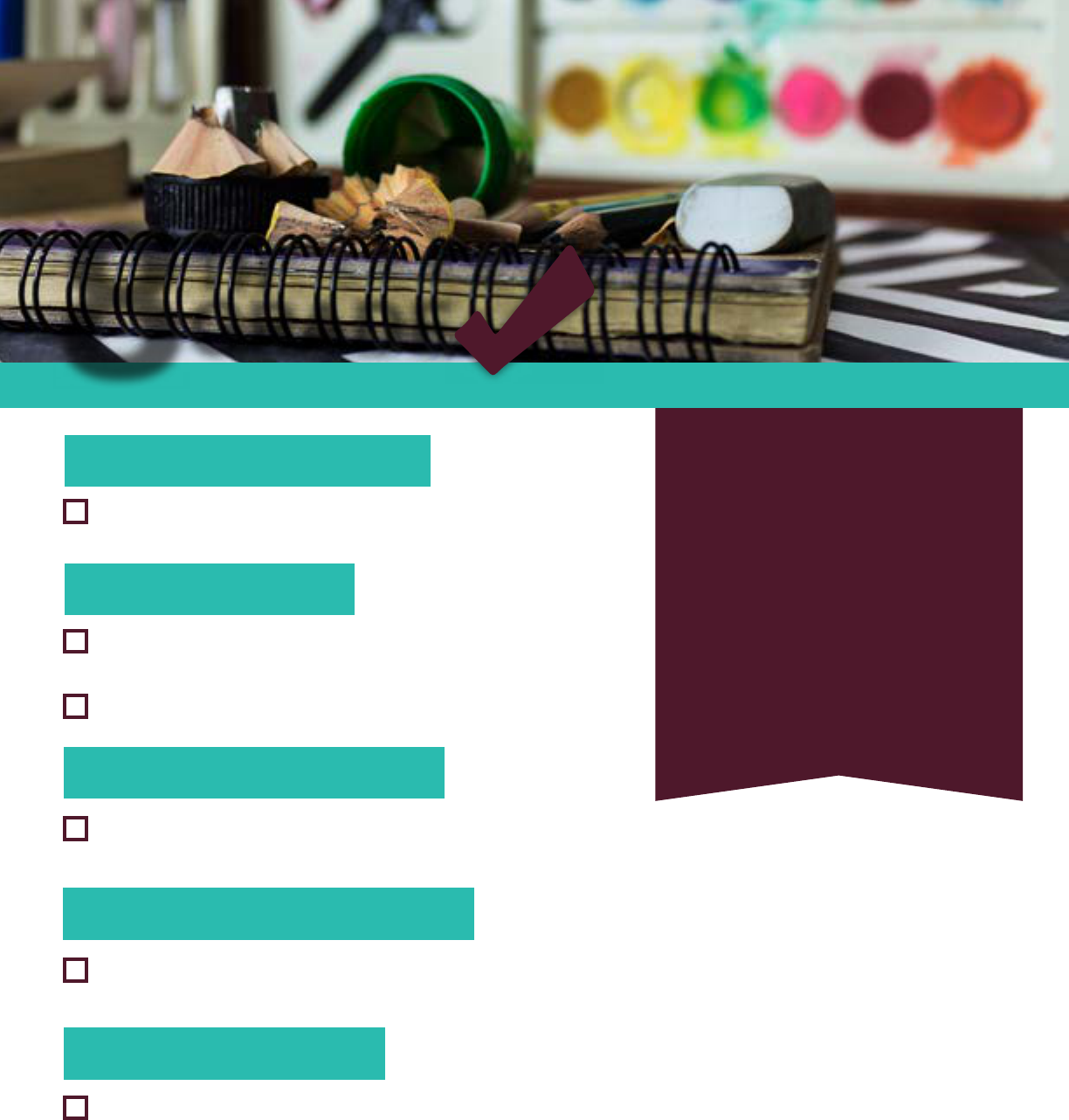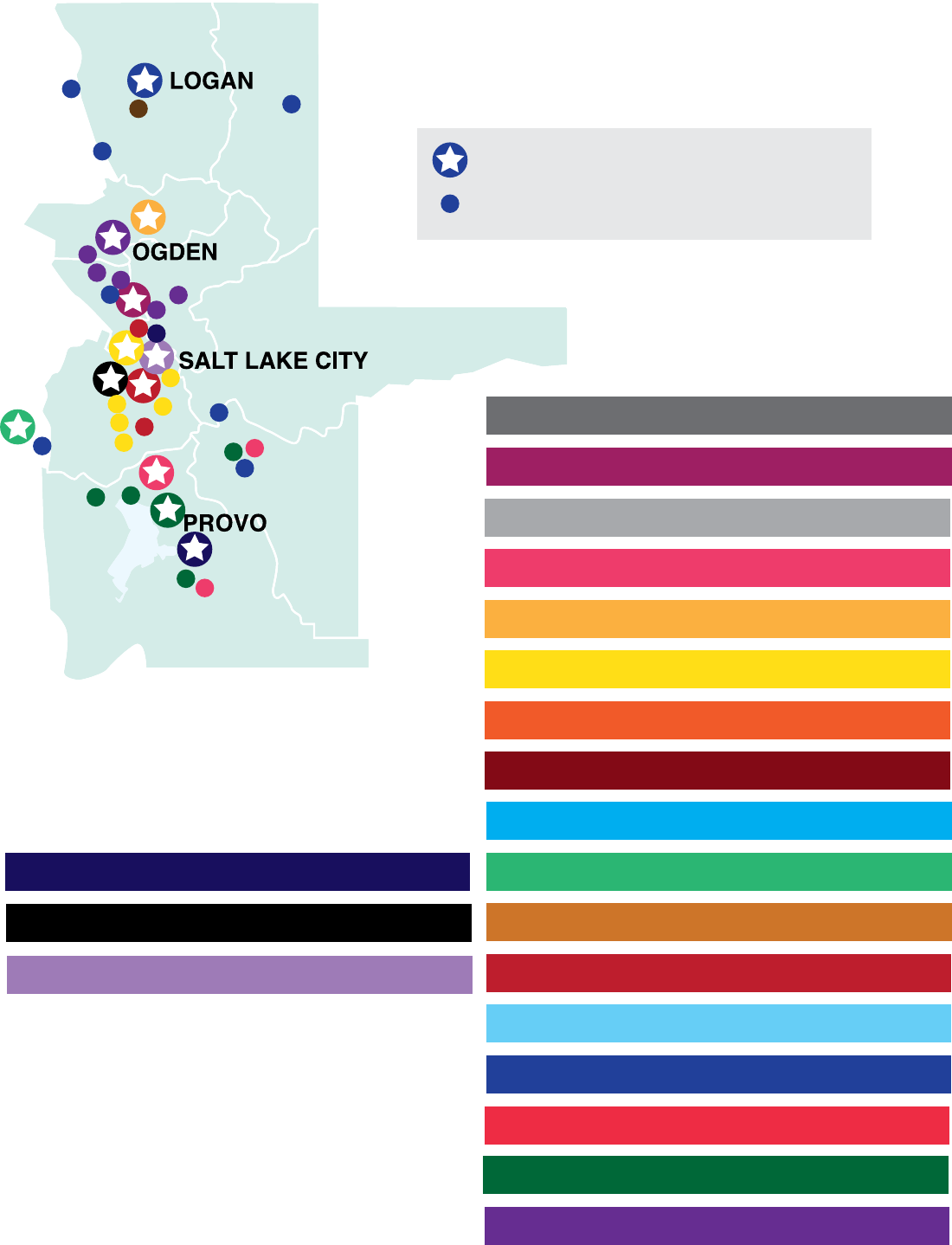
1 | UTAH COLLEGE GUIDE
UTAH
COLLEGE
GUIDE
PREPARING FOR COLLEGE
EARN COLLEGE CREDIT IN HIGH SCHOOL • TAKE THE
RIGHT CLASSES • GRADE-BY-GRADE CHECKLISTS
CHOOSING THE RIGHT COLLEGE
WHAT COLLEGE IS RIGHT FOR YOU? •
UTAH COLLEGE INFORMATION
PAYING FOR COLLEGE
SCHOLARSHIP TIPS • SUBMITTING THE FAFSA •
STUDENT LOANS—WHAT YOU NEED TO KNOW •
GRANTS & WORK-STUDY

20
10
Utah Colleges
Choosing a college.
Grade-by-grade
checklists
What to do and when to do it.
Do high school right
Use high school to prepare
for college.
Technical
Education
1
5
College = Opportunity
What is college?
6
Preparing for college
Take the right classes.
3
TABLE OF CONTENTS

29
24
Tips for finding
scholarships
Where to find
scholarships and
how to apply.
Map of Utah Colleges
No matter where you are,
there’s a college nearby.
Types of colleges
Different colleges serve
different purposes.
Paying for college
It’s possible.
22
26
32
Financial aid
information
What kinds of federal
financial aid are there?
TABLE OF CONTENTS

1 | UTAH COLLEGE GUIDE
DO HIGH SCHOOL RIGHT
Use high school to prepare for college.
Most colleges in Utah are open
admission, meaning if you have a high
school diploma or GED and submit
an application, you’ll be accepted.
With open-admission colleges, you
don’t have to worry about getting
in—but you should do all you can in
high school to prepare academically
for college. Taking the right classes in
high school can help you save money
on future tuition costs and may help
you earn scholarships.
Admissions requirements: Some
colleges have specific admissions
requirements. They will ask you to take
classes beyond what you need for
high school graduation. You may even
need a certain ACT/SAT score or GPA
to be admitted. Some colleges are test
optional.
For more information on
Utah colleges see pg. 20.
DID YOU
KNOW?
DO HIGH SCHOOL RIGHT

2 | UTAH COLLEGE GUIDE
What
college
is right
for you?
What is your
dream job?
Find out what interests you
most by taking the Interest
Profiler Assessment through
the Keys to Success app.
What kind of
certicate or degree
will get you to your
dream job?
Visit UtahMajors.org to figure out which
colleges offer the program to get you where
you want to go.
What type of college
campus is best for you?
• Close to home or far away
• Big city or small town
• Small college or large university
• Live in the dorms or off campus
The best way to know if a college campus is right
for you is to visit colleges you’re interested in. Use
the college directory information at ktsutah.org/
resources to find how to schedule a tour.
What advice
do your family,
friends, and
community
have for you
about college?
DO HIGH SCHOOL RIGHT

3 | UTAH COLLEGE GUIDE
COLLEGE = OPPORTUNITY
Certificates, Associate Degrees, Bachelor’s Degrees
WHAT IS COLLEGE?
Most jobs today require college education beyond high school. Think of college
as one year, two years, four years, or more: college certificates can be earned
in one year or more, associate degrees in two years, bachelor’s degrees in four
years, and graduate degrees in more than four years. The chart below shows how
college credentials can build on each another to get you where you want to go.
Career Field
High School Diploma
Concurrent Enrollment, AP, IB classes
Career and Technical Education
Certificate
Associate
Degree
Bachelor’s
Degree
Graduate
Degree
COLLEGE = OPPORTUNITY

4 | UTAH COLLEGE GUIDE
21
4
++
Certificates and
other Credentials
Associate Degrees
High School Diploma
Bachelor’s Degrees
Graduate and
Professional Degrees
and Credentials
Typically 1 year more
(depending on program)
2 years 4 years
Typically 1–6 years
beyond a bachelor’s
degree
Examples:
• Master’s degrees
• Doctoral degrees
• Graduate Certificates
• Professional
Certificates
Examples:
• High school Career and Technical Education
• College-prep classes
• Work-based learning
Examples:
• Bachelor of Science
• Bachelor of Arts
• Bachelor of Applied
Science
• Professional
Bachelor’s Degree
Examples:
• Certificates
• Professional
Certificates
• Apprenticeships
• Licenses
Examples:
*
• Associate of Applied
Science
• Associate of Science
• Associate of Arts
Provides preparation
for specific jobs and
careers. Programs
can typically be
completed in a few
weeks to a little over
a year of full-time
attendance. Many
certificates build into
and count toward
associate degrees.
Provides preparation
for employment or a
bachelor’s degree.
Programs can typically
be completed in two
years of full-time
attendance.
Provides a well-
rounded education
for success in a career
or for graduate study.
Programs can typically
be completed in four
years of full-time
attendance.
Provides advanced
preparation in a
variety of careers that
require education
beyond a bachelor’s
degree. Programs can
typically be completed
in one to six years of
full-time attendance,
depending on the field
of study.
Associate of Applied Science
This degree provides basic preparation and related
instruction for career development and entry into the job
market, and in some cases for bachelor’s degrees.
Associate of Science and Associate of Arts
This degree typically takes two years to complete and
can be transferred to bachelor’s degree programs at Utah
public colleges..
There
are two
types of
associate
degrees:
Provides foundational skills for success
in life, college, and the workplace.
COLLEGE = OPPORTUNITY

5 | UTAH COLLEGE GUIDE
TECHNICAL EDUCATION
Technical education programs are
great ways to earn a college certificate
and prepare for a specific career.
Colleges offer certificate programs
in all regions of the state, so you
won’t have to go far to earn a college
credential.
Many certificates build into and count
toward associate and bachelor’s
degree programs if you decide to go
further in your education.
Technical education programs are
typically more hands-on than other
certificate or degree programs. This
style of applied education will prepare
you to quickly enter the workforce
and put you on the fast-track to earn
more money as you progress through
college or your career.
There are certificates in business
construction and drafting, energy
services, health, manufacturing, public
safety, service professions, technology,
transportation and more.
Technical education courses and
programs are offered at
• Bridgerland Technical College
• Davis Technical College
• Dixie Technical College
• Mountainland Technical College
• Ogden-Weber Technical College
• Salt Lake Technical College
(SLCC)
• Snow College
• Southwest Technical College
• Tooele Technical College
• Uintah Basin Technical College
• Utah State University (Eastern,
Blanding, and Moab campuses)
See the map on pg. 24-25 for locations.
High school students can enroll
in a technical college tuition free
while completing their high school
graduation requirements. Contact the
colleges’ admissions office to learn
more.
COLLEGE = OPPORTUNITY

6 | UTAH COLLEGE GUIDE
Complete 3 advanced courses
Math
Science
Language Arts
This means 1 Advanced Placement (AP), International Baccalaureate (IB),
or Concurrent Enrollment (CE) course in each of the core areas of high
school graduation:
You can go to college no matter which classes you take in high school. But, to maximize your college
opportunities, try to take the following classes in grades 9-12. They can help you gain skills and experience
relevant to your interests, earn better grades in college, and can increase your score on the ACT (which
helps with qualifying for scholarships). At some colleges, the ACT and other entrance exams are optional.
If you are interested in playing college sports, be sure to check out NCAA guidelines at ncaa.org. You will
have to take specific classes in high school to be eligible.
PREPARING FOR COLLEGE
Take the right classes.
Take the right classes to double your odds of completing college,
gain academic skills, and prepare for scholarships.
PREPARING FOR COLLEGE
Career and Technical Education Pathway Courses
Talk to your school counselor about how your high school CTE classes could apply to college-level
technical education career pathways. For example, take classes at your local technical college that will
build employable skills and count toward a certificate. Remember these programs are tuition free to high
school students.

7 | UTAH COLLEGE GUIDE
What is it?
CE classes earn
high school and
college credit at
the same time.
Students enroll
in a local tech
college during
high school
or receive
credit toward
a certificate
for courses
completed in
high school.
Available
at most
Utah high
schools
Available
for most
high
schools,
usually
at local
technical
college.
Passing the
class
Passing the
class
Many CE classes
fulfill general
education
requirements.
CE also offers
intro classes
in college-
level career
and technical
education.
Classes count
toward the
technical college
certificate
program. Some
certificates
transfer to other
Utah colleges.
$15-20 per class
($5 per credit)
Possible book
costs
Tuition free
Course fees are
applicable
Possible book
and material
costs
AP classes are
writing- and
research-
intensive and
emphasize
study and test-
taking skills.
Available at
most Utah
high schools
Exam score
$98 per
exam
Possible
book costs
$123 per
exam
Possible
book costs
Check with
your college’s
academic
adviser.
IB classes are
writing- and
research-
intensive.
IB students
also perform
community
service and
write an
extended essay.
Only offered
at certain
Utah high
schools
Exam score
Check with
your college’s
academic
adviser.
Where is it
available?
College credit
earned through:
Cost:
*
What college
credit will I
earn?
CONCURRENT
ENROLLMENT (CE)
TECHNICAL
EDUCATION
ADVANCED
PLACEMENT (AP)
INTERNATIONAL
BACCALAUREATE (IB)
*
based on costs for the
2023-24 school year; costs
may vary by high school
EARN COLLEGE CREDIT WHILE IN HIGH SCHOOL
There are four ways to earn college credit in high school. This is a great way to get a head start on your college education,
plus it’ll save you time and money. Talk with your counselor to see which classes your high school offers.
When earning college credit in high school, talk with your counselor to make sure you’re earning credit that counts for
either general education or toward your certificate or program at the college you plan to attend.
PREPARING FOR COLLEGE

8 | UTAH COLLEGE GUIDE
What is a major?
When you attend a college that offers
degree programs, you will select a
college major, which is the specific
subject area that you specialize
in. Typically, between one-third to
one-half of your college classes
will be in your major or related to it.
Some careers require a particular
major, while others just ask for a
college degree (like an associate or a
bachelor’s), so you can choose a major
that interests you the most.
Visit utahmajors.org to identify
possible majors.
What is general
education?
If you’re earning an associate or
bachelor’s degree, you will be required
to take several general education
courses. General education allows you
to explore a variety of subjects while
developing critical thinking, writing,
and problem-solving skills. No matter
what major you decide, you’ll have
to take one or two classes in each of
the academic disciplines like math,
science, English, and history. General
education credit requirements are the
same at all Utah public colleges and
credit earned for general education
courses are fully transferable.
What is technical
education?
When you enroll in a technical education
program at your local technical college,
you are earning a certificate. All course
work relates directly to the knowledge
and skills required to work in the
industry.
Visit ktsutah.org/resources to identify
possible majors. See the Utah Programs
and Major Guide.
PREPARING FOR COLLEGE

9 | UTAH COLLEGE GUIDE
If you decide not to take math as a senior, you may be behind once
you enter college because all degree programs require at least one
math course. The good news is you might be able to fulfill that math
requirement while you are still in high school through AP, IB, or
Concurrent Enrollment (CE) classes.
Depending on your major, a general education math class may be the last
math class you ever need. By taking college-level math in high school, you
can save on future tuition costs and benefit from from having the concepts
fresh in your mind. It is often easier to succeed in college math when the
material is still familiar.
Remember, CE courses can transfer across any public college in Utah
that offers degrees, and the AP or IB subject exam credits are recognized
equally at every Utah college. Meet with your counselor to see which
classes are available at your school and which options fit best with your
future plans.
Which CE math class should I take?
Are you interested in ...
• English/languages
• Fine arts
• Humanities
• Performing arts
Take CE Math 1030
Intro to Quantitative Reasoning
• History
• Nursing
• Psychology
• Social Sciences
Take CE Math 1040/STAT 1040
Intro to Statistics
• Business
• Biology & physical sciences
• Engineering
• Education
Take CE Math 1050
College Algebra
Interested in something else?
Talk with your counselor about
the right CE math for you.
TAKE MATH YOUR
SENIOR YEAR
PREPARING FOR COLLEGE

10 | UTAH COLLEGE GUIDE10 | UTAH COLLEGE GUIDE
Whether you’re considering a certificate, an associate degree, a bachelor’s
degree, or a professional/graduate degree, these grade-by-grade checklists will
help you prepare to be successful after high school graduation!
GRADE-BY-GRADE
CHECKLISTS
GRADE-BY-GRADE CHECKLISTS

11 | UTAH COLLEGE GUIDE
These grade-by-grade checklists
are designed to help you prepare
for college during grades 8–12.
We recommend spreading these
tasks out over your junior high and
high school years, but you can
complete most of these tasks at
any time.
What are the grade-by-
grade checklists?
Talk to a parent or other adult about what you like to do, what you’re
good at, and what you want for your future.
Meet with your school counselor to develop a four-year high
school plan. Try to fit in the recommended classes on pg. 6.
Research the admissions requirements at some of the colleges you’re considering, including GPA, whether taking the
ACT/SAT is optional, and specific high school classes they may require.
With the help of a parent or other adult, open a college savings account to save for your future. Consider a savings
account through a bank, credit union, or a my529 account. Learn more at my529.org.
Explore careers through Interest Profiler through the Keys to
Success app to learn where your strengths and interests lie.
Take the Reality Check at ktsutah.org/resources.
TH
8
GRADE
Prepare for high school classes.
For more information, visit ktsutah.org/resources
Start the conversation now.
Learn about yourself.
Make your high school plan.
Start saving for college.
GRADE-BY-GRADE CHECKLISTS

12 | UTAH COLLEGE GUIDE
TH
9
GRADE
Volunteer in your community. Find volunteer opportunities with U Serve Utah at userve.utah.gov and United
Way 2-1-1 at uw.org/211/volunteer.
Sign up for at least one school club or after school program. Ask your counselor about Career and Technical
Education (CTE), Advanced Placement (AP), International Baccalaureate (IB), Concurrent Enrollment (CE), and
technical education courses available at your high school.
Volunteer experience and after-school activities boost your resume and may help you qualify for scholarships.
Meet with your school counselor and develop a four-year high school plan.
Read about the various ways to pay for college, including scholarships, grants, work-study, and student loans on
ktsutah.org/resources.
Make a plan to pay for college with your parents. For example, part-time work in high school and college can help
you pay for college costs and start building your resume.
Start to build a scholarship and college admissions resume to track your achievements. Use the Paying for
College Guide at ktsutah.org/resources to get you started.
With the help of an adult, open a college savings account. Learn more at my529.org. If you already have a
savings account, contribute what you can to it.
Use the College Guide to research colleges in Utah and discover which colleges may be right for you.
Talk with your parents, friends, and community members about their college experience, and start
thinking about what you want out of yours.
Take campus tours at two-year, four-year, and technical colleges.
Get involved in your school and community.
Explore college options.
Do high school right.
Learn about the different ways to pay for college.
For more information, visit ktsutah.org/resources
GRADE-BY-GRADE CHECKLISTS

13 | UTAH COLLEGE GUIDE
TH
10
GRADE
Continue to be involved in school clubs, after school programs, and volunteering. Track your volunteer
hours using a spreadsheet.
Take campus tours at two-year, four-year, and technical colleges.
Read about the differences between a certificate, associate, bachelor’s, and other advanced degrees on
ktsutah.org/resources.
Use your Interest Profiler results through the Keys to Success app to see what college majors and programs you
might be interested in.
Explore certificates and degrees offered at Utah colleges on the Utah Programs and Majors guide on ktsutah.
org/resources.
Check with your counselor or college advisor to see what college prep support you might be eligible for
in your area, like AVID, TRIO, or GEAR UP programs.
Meet with your school counselor to make sure you’re on track to complete Math III no later than the end
of 11th grade.
Ask your counselor about Career and Technical Education (CTE), Advanced Placement (AP),
International Baccalaureate (IB), Concurrent Enrollment (CE), and technical college classes available at
your high school.
Create a list of opportunities you can engage in such as internships and applied learning opportunities
within the region you live.
Stay involved and continue to explore your interests.
Look into support and mentoring programs.
Take the right classes.
Think about what certicate or degree you will need for your future career.
For more information, visit ktsutah.org/resources
Volunteer experience and after-school activities boost your resume and may help you qualify for scholarships.
GRADE-BY-GRADE CHECKLISTS

14 | UTAH COLLEGE GUIDE
For more information, visit ktsutah.org/resources
Use ktsutah.org/resources to find scholarships and apply to at least one this year. Keep your
scholarship resume updated.
Study! Your ACT score will help determine your eligibility for some scholarships and acceptance
into some colleges. Get free ACT test prep materials at ktsutah.org/resources.
Download the free ACT app to get daily ACT test prep questions.
Research the college(s) you’re interested in to check if they require the ACT. Some colleges may be
test optional.
Estimate college costs by looking up the net price calulator at your top college choices.
If you are an eligible Utah non-resident student, you may qualify for in-state tuition. Ask your college’s
student success center for more information.
Add funds to your credit union, bank, or my529 savings account. Learn more at my529.org.
Talk to your counselor about how your high school CTE classes could apply to college-level CTE
career pathways.
Research and apply for scholarships—yes, even before senior year!
Learn how much college costs.
Keep saving for college.
Align your CTE pathway with your college plans.
Start preparing for the ACT.
GRADE-BY-GRADE CHECKLISTS

15 | UTAH COLLEGE GUIDE
TH
11
GRADE
For more information, visit ktsutah.org/resources
Sign up for classes that challenge you, like honors classes or those that earn college credit, such as
Advanced Placement (AP), International Baccalaureate (IB), Concurrent Enrollment (CE), or technical
education courses. Talk to your school counselor for more information.
Verify with your counselor that you are taking classes that will help you succeed in college.
Learn how your high school career and technical education (CTE) classes apply to college-level CTE
career pathways. Visit with a technical college adviser to enroll in a certificate program and track your
progress toward graduating with a certificate while in high school.
Take classes at your local technical college that will build employable skills and count toward a
certificate. Remember these programs are tuition free for high school students.
Plan to take the ACT in the spring. You can get free ACT test preparation materials at ktsutah.org/
resources or use the free ACT app for daily prep questions. A good ACT score can help earn scholarship
money and play a key role in your acceptance to certain colleges.
Research your colleges of interest to check its ACT requirements. Some colleges may be test optional.
Meet with your counselor to make sure you pick the right math class for your future. It’s best to complete
your college math requirements through CE while still in high school.
See pg. 9 to learn which CE math class best fits your future plans.
Focus on your classes.
Align your CTE pathway with your college plans.
Think about what math class you’ll take your senior year.
Take the ACT.
Forecast how much financial aid you could qualify for by using the Federal Student Aid Estimator at studentaid.gov.
Learn about the many ways to pay for college.
GRADE-BY-GRADE CHECKLISTS

16 | UTAH COLLEGE GUIDE
Make a list of your top college choices. If you’re thinking about going to college in Utah, check the
information on Utah colleges on pg. 20 to learn more.
Create a Keys to Success login at ktsutah.org/log-in to explore your two-year, four-year and technical
college options.
Consider your college options.
Some colleges and scholarships require one or more letters of recommendation. Decide which teachers
you’d want to write letters of recommendation next year and ask them in advance.
Get a summer job to save money and build your resume. Consider contributing a portion of your earnings
to a my529 or another savings account to help fund your future education.
Review your career interest profiles on the Interests Profiler or take them again at ktsutah.org/resources.
Shadow at a business or organization that interests you and ask about internship opportunities.
Talk to professionals currently working in your area of interest. Ask your school counselor or parents/
guardians to help you find them.
Learn about scholarships offered by the State of Utah on ktsutah.org/resources.
Apply for as many scholarships as you can. If your high school has a scholarship coordinator, make
an appointment. They can help you find scholarships that fit your qualifications. You can also find
scholorships on ktsutah.org/resources.
Get organized for your nal year.
Research possible careers.
Keep applying for scholarships.
GRADE-BY-GRADE CHECKLISTS

17 | UTAH COLLEGE GUIDE
TH
12
GRADE
Check in with your counselor and/or college access adviser about your plan for college and career readiness.
Ask for letters of recommendation. Some colleges and scholarships require one or more letters of
recommendation. Connect with teachers and counselors early in the fall of your senior year.
Stay on track to complete a certificate program at your local technical college before high school graduation or
during the summer after. Remember, these programs are tuition-free to high school students.
Apply to colleges during the fall of your senior year. Participate in Utah College Application Week at your
school. Ask your counselor for more information.
Apply to more than one college so you can compare the colleges’ financial aid offers and their class sizes,
locations, programs, and more. For help comparing colleges, see the Facts at a Glance at ktsutah.org/
resources.
Research the ACT score requirements for the colleges you’re applying to. Some colleges make tests
optional but still consider your score for scholarships. If you want to improve your score, study thoroughly
and retake the ACT in the fall of your senior year. Check college admissions deadlines to ensure your new
ACT scores will be ready in time.
If you haven’t already, create a Keys to Success login at ktsutah.org/log-in to explore your two year, four
Stay focused.
Apply to college in the fall.
For more information, visit ktsutah.org/resources
Complete your Free Application for Federal Student Aid (FAFSA) as early as October at studentaid.gov.
Get help completing your FAFSA by visiting ushe.edu/fafsa, or by attending a FAFSA Completion Open
House during the school year. Check with your counselor to find an event at your school or nearby.
If you are an eligible Utah non-resident student, explore scholarship opportunities and review the
qualifications for in-state tuition by contacting the student success center at your college.
Fill out your FAFSA.
** Even if you don’t think you will qualify for federal grants, you should still fill out the FAFSA. The
State of Utah and many colleges require it for scholarships and other aid. **
GRADE-BY-GRADE CHECKLISTS

18 | UTAH COLLEGE GUIDE
Be sure to take the right math for your future career. Talk to your counselor and use the guide on pg. 9 to help
you figure out which math class is right for you.
Take math during your senior year.
For more information, visit ktsutah.org/resources
Research scholarships offered by the colleges you’ve applied to and check deadlines.
Learn about scholarships offered by the State of Utah at ktsutah.org/resources.
Apply for as many scholarships as you can during your senior year. Use resources at ktsutah.org/resources to
help you find scholarships.
Visit the websites or call the colleges you’ve been accepted to and ask about their first-year experience
programs and summer bridge programs.
Send your final high school transcripts to your college once you graduate.
Be sure to accept the financial aid you’ve been awarded. Connect with your college’s financial aid office to
confirm everything is in order before the semester begins.
Participate in your school’s College Decision Day activities to celebrate your accomplishments. Ask your
counselor for more information.
If you have an IEP/504 or a disability that will need accommodation, start making arrangements now by
contacting colleges’ disabilities resource centers.
Visit with college student success centers to learn about scholarships, tutoring, events, and more.
Check on campus resources and services.
Continue applying for scholarships.
Narrow it down.
Be proud. Celebrate!
GRADE-BY-GRADE CHECKLISTS

19 | UTAH COLLEGE GUIDE
It is FREE to APPLY to ALL Utah public colleges and universities!
• SEARCH: Some Utah colleges offer open houses in the fall to give you a chance to visit campus. Find open houses
for the colleges you are interested in and mark these events on your calendar. Check to see if your high school hosts
one.
• PARTICIPATE: High schools across the state host Utah College Application Week (UCAW) in the fall. During UCAW,
you’ll have the opportunity to learn more about college and apply!
To learn more about UCAW visit ktsutah.org/resources.
GRADE-BY-GRADE CHECKLISTS

20 | UTAH COLLEGE GUIDE
Ensign College
Salt Lake City
ensign.edu
801-524-8100
Utah Tech University
formerly Dixie State University
St. George
utahtech.edu
435-652-7500
Brigham Young University
Provo
byu.edu
801-422-4636
Bridgerland Technical College
Logan/Brigham City
btech.edu
435-753-6780
Dixie Technical College
St. George
dixietech.edu
435-674-8400
Davis Technical College
Kaysville
davistech.edu
801-593-2500
UTAH COLLEGES
UTAH COLLEGES AND UNIVERSITIES
From technical and community colleges to research universities, there’s
a college in Utah that’s right for you. Think about what you want out of your
college experience, and find out which college offers the programs you’re
interested in.

21 | UTAH COLLEGE GUIDE
University of Utah
Salt Lake City
utah.edu
801-581-7200
Utah Valley University
Orem
uvu.edu
801-863-8888
Weber State University
Ogden
weber.edu
801-626-6000
Westminster University
Salt Lake City
westminsteru.edu
801-484-7651
Utah State University
Logan
usu.edu
435-797-1000
Southern Utah University
Cedar City
suu.edu
435-586-7700
Ogden-Weber Technical College
Ogden/Weber
otech.edu
801-627-8300
Tooele Technical College
Tooele
tooeletech.edu
435-248-1800
Mountainland Technical College
Lehi/Orem/Spanish Fork
mtec.edu
801-753-6282
Southwest Technical
College
Cedar City/Kanab
stech.edu
435-586-2899
Uintah Basin Technical College
Roosevelt/Vernal
ubtech.edu
435-722-6900
UTAH COLLEGES
Snow College
Ephraim
snow.edu
435-283-7000
Salt Lake Community College
Salt Lake City
slcc.edu
801-957-7522

22 | UTAH COLLEGE GUIDE
TYPES OF COLLEGES
In Utah, different colleges serve different purposes. Depending on your
future career plans, some colleges may be a better fit than others for you.
Technical colleges
Technical colleges offer shorter certificate programs designed to qualify students to work in a variety of
occupational fields. If you’re looking to quickly start a job in a competitive and in-demand industry or skilled
trade, a technical college may be the right fit for you. A technical college may be a separate institution or may be
part of a larger community college or university. In addition, many programs offered at technical college transfer
into associate degrees, saving you time and money.
Community colleges
Community colleges offer certificates and associate degrees at a lower cost than universities, often with smaller
class sizes. They also offer job training programs that can quickly get you into the workforce, as well as general
education and major courses that you can be transferred to a university for a bachelor’s degree.
Regional universities
Regional universities offer associate, bachelor’s, and some master’s degrees.
Research universities
Research universities may offer the same bachelor’s degree programs as other institutions, but they also
provide a wide range of graduate degrees, such as master’s and doctoral programs. In addition, faculty and
students at these universities often engage in specialized research across various fields.
Public versus Private colleges
Public colleges and universities are owned and supported by the State of Utah. Private, not-for-profit colleges
and universities are not owned by the state. For-profit schools may charge more in tuition, offer fewer degree
programs, and are sometimes unaccredited, meaning they are not approved by a national or regional
accrediting association. Making sure a school is accredited and that credits can be transferred to other
institutions is another way students can make sure they are getting a valuable education and a credential that
will appeal to potential employers.
Quick tip: all of the colleges and universities included by name in this guide are
accredited and not-for-profit.
UTAH COLLEGES

23 | UTAH COLLEGE GUIDE
Bridgerland Technical College
Brigham Young University
*
Davis Technical College
Utah Tech University
Dixie Technical College
Ensign College
*
Mountainland Technical College
Ogden Technical College
Salt Lake Community College
Snow College
Southern Utah University
Southwest Technical College
Tooele Technical College
Uintah Basin Technical College
University of Utah
Utah State University
Utah Valley University
Weber State University
Westminster University
*
COLLEGE NAME
*
PRIVATE COLLEGES
TECHNICAL CERTIFICATES
ASSOCIATE DEGREES
BACHELOR’S DEGREES
GRADUATE DEGREES
UTAH COLLEGES

24 | UTAH COLLEGE GUIDE
COLLEGES IN UTAH
UTAH COLLEGES
No matter where you are in Utah, there’s a college nearby.

25 | UTAH COLLEGE GUIDE
UTAH COLLEGES
Utah Tech University · St. George
Southern Utah University · Cedar City
Snow College · Ephraim
USU Eastern · Price & Blanding
Brigham Young University · Provo
Utah Valley University · Orem
Westminster University · Salt Lake City
University of Utah · Salt Lake City
Salt Lake Community College · Salt Lake City
Ensign College · Salt Lake City
Weber State University · Ogden
Utah State University · Logan and Statewide
Tooele Tech College · Tooele
Mountainland Tech College · Lehi
Dixie Tech College · St. George
Uintah Basin Tech College · Roosevelt & Vernal
Southwest Tech College · Cedar City
Ogden-Weber Tech College · Ogden
Davis Tech College · Kaysville
Bridgerland Tech College · Logan
PRIVATE COLLEGES
PUBLIC COLLEGES
Main campus
Regional campuses and sites

26 | UTAH COLLEGE GUIDE
PAYING FOR COLLEGE
College can be expensive and figuring out how you’re going to pay for it can seem
like an overwhelming task. Luckily, there are resources to help you prepare and
many different ways to get the money you need.
With many funding options available—from scholarships and grants to work-study
and student loans—you can pay for college.
No matter what grade you’re in, there are things you can do right now to get started.
PAYING FOR COLLEGE

27 | UTAH COLLEGE GUIDE
College comparison worksheet
College
Majors the
college
offers I’m
interested in
Majors or
specific
programs
the college
offers I’m
interested in
Tuition
Fees
Housing or
commuting
costs
Total costs
per year
(tuition, fees,
housing,
commuting, and
books)
Special
admissions
requirements
GPA and ACT
requirements
for academic
scholarships
Application
fee
Application
deadline
Notes
PAYING FOR COLLEGE
Use this worksheet to compare colleges you’re interested in. Search online, get a Facts at a Glance booklet from your
counselor or on ktsutah.org/resources, or use the Utah colleges information starting on pg. 20 in this guide to help you.

28 | UTAH COLLEGE GUIDE
Saving money is an important part of college affordability. Start saving as much as you can, as early as you can. Here
are a few tips to help you get started.
SAVING FOR COLLEGE
Bank/credit union savings
and cash deposit (CD)
accounts
Research terms and conditions for
a savings account that meets your
needs. Find more information at your
bank/credit union and on websites
such as americasaves.org to compare
options before making your decision.
my529
my529, Utah’s official 529 educational
savings plan, is a tax-advantaged
529 plan designed to encourage
investing for future qualified education
expenses.
Family and friends can even contribute
money to your account for special
occasions like birthdays and holidays.
Learn more at my529.org.
Part-time work
Part-time work in high school and
college can help you build your
resume and pay for college costs.
Save as much as you can in your
college savings account.
Scholarships
Scholarships are not just for students
with good grades or an impressive
list of accomplishments. You can get
scholarships for volunteer service,
leadership, talent, financial need, and
more.
Start saving as much as you can, as early as you can.
PAYING FOR COLLEGE

29 | UTAH COLLEGE GUIDE
TIPS FOR FINDING SCHOLARSHIPS
Create profiles on trustworthy national scholarship search websites such as:
• USHE.edu/state-scholarships-aid
• ktsutah.org
• myscholly.com
• bigfuture.collegeboard.org/scholarship-search
• unigo.com
• goingmerry.com
• fastweb.com
Explore options at your school. Talk with your college access advisor and/or
counselor, scholarship coordinator, and athletics coach. Ask about scholarships
through your employer, your parent’s employer, or any clubs or organizations you’re
involved with.
Use the Keys to Success app at ktsutah.org to get started.
Publicly funded and private scholarships are available to students. Students who
may not qualify for publicly funded scholarships should explore private scholarships.
Check with the financial aid offices at the colleges you plan to attend. Many colleges
have scholarships posted on their financial aid and department websites. If you know
what you want to study, check for scholarships through your major or department.
In 12th grade, submit the Free Application for Federal Student Aid (FAFSA) at
studentaid.gov—sometimes scholarships require this as part of their application
process.
Apply. Apply. Apply. Don’t count on only one scholarship to fund your education.
Apply for scholarships even if you don’t plan to go to college right away—like if
you plan to serve a religious mission or join the military. See pg. 35 for more info.
Beware of scholarship scams!
You should never pay money to apply for a scholarship.
!
PAYING FOR COLLEGE

30 | UTAH COLLEGE GUIDE
The Opportunity Scholarship is for students who complete advanced courses
in core subject areas during high school to help them be ready for college.
Scholarship Facts:
1. The Opportunity Scholarship is an achievement-based scholarship that you can earn by taking advanced (AP/IB/CE)
courses in high school to prepare for college.
2. The Opportunity Scholarship can be used at Utah public colleges that offer degrees and at these private institutions:
Brigham Young University, Ensign College, Westminster University, and Western Governors University. Students
may contact their institution’s financial aid office for a deferment for a humanitarian/religious/military service, or for a
medical reason.
3. You must apply for the Opportunity Scholarship during your senior year, but you should start planning to complete
the required courses in grades 9-12 and maintain the required GPA. To learn about the scholarship requirements,
visit OpportunityScholarship.org.
4. To apply, you will be required to submit a completed FAFSA application, but you are NOT required to qualify for
federal grants or loans.
5. The Opportunity Scholarship can be used to help cover the cost of tuition and fees for a total of four semesters,
subject to meeting renewal requirements. Each student’s award amount will vary based on individual circumstances
and available funding. Visit OpportunityScholarship.org for more information.
OPPORTUNITY SCHOLARSHIP
The Technical Education Scholarship is for students who enroll in
eligible technical education programs in Utah that lead to high-demand,
high-wage occupations.
The Technical Education Scholarship can be used at any public technical college in Utah or qualifying
technical programs at SLCC, USU-Eastern, USU-Blanding, USU-Moab, or Snow College.
Awards can be used to cover the cost of tuition, fees, and books. Talk to the financial aid office at your college
to see if you qualify for the Technical Education Scholarship.
TECHNICAL EDUCATION SCHOLARSHIP
PAYING FOR COLLEGE
STATE SCHOLARSHIPS
The State of Utah offers several scholarships. Included in this guide are two
achievement-based scholarships and one need-based scholarship. The Opportunity,
Technical Education and Promise Scholarships provide options for all students to
receive financial support to attend any Utah public college or university. Talk to your
college financial aid office to learn more about these and other state aid programs.

31 | UTAH COLLEGE GUIDE31 | UTAH COLLEGE GUIDE
The Utah Promise Grant is for students with financial need to pay
for college and is available at all public colleges and universities in
Utah, including technical colleges and accredited private non-profit
institutions.
The Utah Promise Grant helps students with financial need pay for college and is available at all public
colleges and universities in Utah, including public technical colleges, and accredited private nonprofit
institutions.
Students are required to complete the Free Application for Federal Student Aid (FAFSA) to be considered
for this grant.
Talk to the financial aid office at your college or university to see if you qualify for the Utah Promise Grant.
There are other state aid programs available to students. Visit ktsutah.org/
resources, ushe.edu/state-scholarships-aid, or contact the financial aid office
at your college for information about other programs to see if you qualify.
UTAH PROMISE GRANT
OTHER STATE AID PROGRAMS
PAYING FOR COLLEGE

32 | UTAH COLLEGE GUIDE
APPLY FOR FINANCIAL AID
Submitting your Free Application for Federal Student Aid (FAFSA) at studentaid.gov is
the only way to receive federal financial aid for college.
Who should submit the FAFSA?
Everyone should submit, even if you think you make too much money to qualify for financial aid. You never know what
you’ll be awarded unless you apply.
What does the FAFSA do?
The FAFSA determines your eligibility for federal financial aid—grants, work-study, and student loans—as well as aid from
the State of Utah (like the Opportunity Scholarship) and your college.
When should I submit my FAFSA?
It’s best to submit the FAFSA the same time you apply to college in the fall of your senior year. The FAFSA application
opens October 1 of your 12th grade year. You can complete the application at any point in your senior year, but for the
following school year you should apply as soon as you can. However, you can still submit your FAFSA later than that
if needed. Check the priority deadline at the colleges you’re applying to so you know when you should complete the
FAFSA. Remember: You need to resubmit the FAFSA every year you’re in college.
Where do I go to submit the FAFSA?
Submit the FAFSA at studentaid.gov. Never use any other website to file the FAFSA. If you need help submitting your
FAFSA, visit ushe.edu/fafsa, talk to your counselor, or use the FAFSA resources found at ktsutah.org/resources.
Even if you don’t think you’ll qualify for financial aid, it’s worth taking a few minutes to
submit the FAFSA. You may be surprised!
$
PAYING FOR COLLEGE

33 | UTAH COLLEGE GUIDE
What is it? What do I need to know?
A grant is money for college
that you don’t have to pay
back, as long as you maintain
satisfactory academic progress.
A grant is usually provided by
the state or federal government.
Work-study is a part-time job
for students,usually on campus
and has flexible hours that work
around your class schedule.
Student loans are money you
borrow for college that you
have to pay back—even if you
don’t graduate.
Grants do not have to be repaid.
They’re based on financial need determined by
the FAFSA.
One of the most common grants is the Federal
Pell Grant. The maximum award is more than
$6,000 per year.
Ask the financial aid office at your college for
more information about available grants.
Work-study jobs are usually on campus and
offer flexible hours.
Work-study jobs come with financial aid
benefits. They’re based on financial need
determined by the FAFSA.
They can give you work experience related
to your college major (such as working in a
chemistry lab, tutoring center, or campus
If you’re eligible to receive grants or take part
in the work-study program, always use those
funds first.
Apply for as many scholarships as possible and
use college savings before deciding to borrow
student loans.
Explore federal student loans first, through the
FAFSA, as they often have lower interest rates
and more flexible repayment options compared
to private loans.
STUDENT
LOANS
WORK-
STUDY
GRANTS
KINDS OF FEDERAL FINANCIAL AID
Tip: Use the Federal Student Aid Estimator at studentaid.gov
to estimate how much you might be eligible to receive in grants,
work-study, and federal student loans.
PAYING FOR COLLEGE

34 | UTAH COLLEGE GUIDE
When you file the FAFSA and send it to your college, the financial aid office will
send you a financial aid offer letter that includes the cost of attendance (tuition,
fees, room and board, etc.) and what scholarships, grants, loans, or work-study
you are eligible for.
Sometimes the cost of attendance will be more than your college savings,
scholarships, grants, or work-study funds. If you’ve filed the FAFSA, you are
eligible for federal student loans, which are a good option to cover those
additional remaining college costs.
1. Create a budget with help from your college’s financial wellness center.
Many colleges have a financial wellness center that will answer your questions
about budgeting, loans, and ways to pay for college.
2. Explore ways to save, such as using student discounts or renting textbooks.
3. Borrow only what you need and understand the loan.
Remember, you are not required to borrow the maximum amount you’ve been
offered. Any money that you borrow must be repaid with interest, so only borrow
what you need! Read the terms and conditions of the federal student loan
carefully when you accept your loan.
4. Borrow federal before private.
Federal student loans have advantages that private loans can’t match, such
as fixed interest rates and flexible repayment options. Explore more benefits of
federal student loans at studentaid.gov.
Should I take out a student loan?
What to consider before taking out a student loan:
PAYING FOR COLLEGE

35 | UTAH COLLEGE GUIDE
COLLEGE IS READY WHEN YOU ARE!
It is still important to apply for college and financial aid as a high
school senior to secure your admissions and scholarships. Many
scholarships are only open to graduating seniors. Be sure to
discuss the deferral process with your college so you don’t lose
your acceptance or scholarship funding.
Utah public colleges and universities do not charge application
fees, applying is free! For institutions that do have fees, there
are programs available to help cover those costs while you’re
still in high school, but these opportunities often disappear after
graduation. Apply now to explore your options.
Once you’ve been accepted, discuss deferring enrollment or
taking a leave of absence with your college. Failing to defer
may result in losing your acceptance and scholarship funding.
If you’re leaving the country or will not have access to email,
complete a Family Educational Rights and Privacy Act (FERPA)
form. This form allows colleges to discuss your information with
parents or guardians after you turn 18. Contact your college’s
admissions office for details on the necessary paperwork.
What if I’m not going to college
right after high school?
Planning to join the military, Peace Corps, take a
gap year, or serve a religious mission?
PAYING FOR COLLEGE

36 | UTAH COLLEGE GUIDE
If you are thinking about college for
yourself, call acollege admissions office
to see what they can offer you.
Colleges have many resources like
tutoring, child-care assistance, online
options, and even classes where you only
meet once per week that can help you
balance family, work, and school.
Start or finish your college education now!
PARENTS:
College is for you,too!
